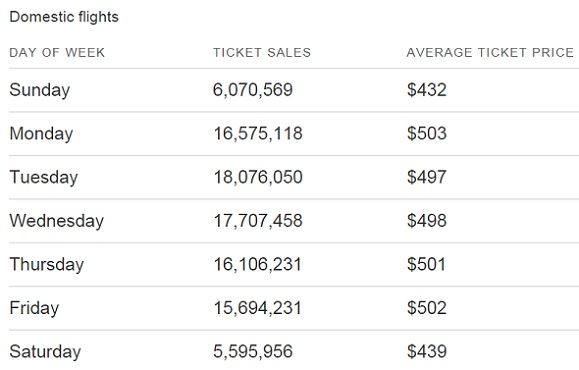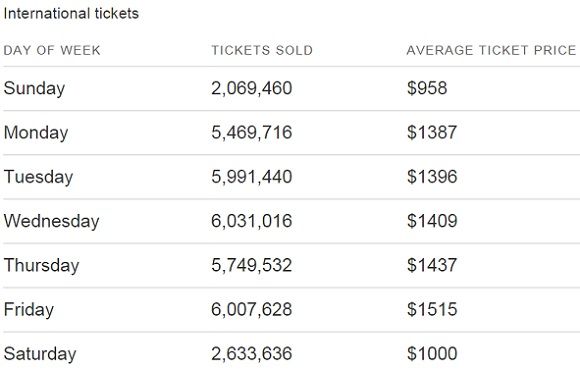If you’re looking for the cheapest day to buy tickets, you want to read How and When to Find the Cheapest Airfares.
What you don’t want to do is believe the ARC study that says Sundays are the cheapest day to buy airfare.
I was actually expecting that the Airlines Reporting Corporation, which has tons of real data to parse through, would actually offer a useful data-driven answer to “what’s the cheapest day to buy airline tickets” as though that were really a thing.
The problem is that their data set is actual ticket purchases and not airfares. So they’re capturing the average price of tickets purchased on a given day of the week, not the cheapest day to buy tickets.
The reason why there is a difference is because different kinds of tickets are purchased on different days of the week.
It’s really quite simple: very few price insensitive business traveler airfare purchases are made on the weekend. So the sample bias is that on the weekend you have a disproportionate number of price sensitive leisure ticket purchases, while business traveler ticket purchases show up more in the weekday data.
The Aviation Biz Blog shows the study’s airfare by day of week chart.
Here’s the average price of domestic ticket by day of the week purchased:

Here’s Why The Data on the Cheapest Day to Buy Tickets is Misleading
Unsurprisingly, the volume of purchases and the average airfare is lower on Saturday and Sunday than it is during the business week. It isn’t that airlines are aggressively discounting on the weekends, when they have fewer revenue management staff working. And it isn’t the case that you will find lower ticket prices on the weekend.
Instead you will find that the people buying airfare on the weekend will be buying their tickets farther in advance, at times other than peak travel times, as roundtrips where fare rules require it (and with Saturday stays when fare rules require that). And the people purchasing tickets will disproportionately adjust their travel times to choose flights that cost less.
We see a very similar pattern for international airline ticket purchases as well.

Bottom-line is that while this data, that ARC is in a unique position to provide, is interesting — telling us what days of the week the cheaper tickets were purchased doesn’t tell us the cheapest day to buy tickets.
It only tells us when other price sensitive shoppers are buying.
- You can join the 40,000+ people who see these deals and analysis every day — sign up to receive posts by email (just one e-mail per day) or subscribe to the RSS feed. It’s free. You can also follow me on Twitter for the latest deals. Don’t miss out!


your second chart is domestic not int’l
The second graphic, referenced as showing international fares is a dupe of the domestic one.
Agree that the data they provided is misleading. It would be interesting to see the actual costs after removing the business fare bias.
double domestic picture, Gary.
graphic fixed 🙂
The days-advance data in that report was actually quite useful and valid.
No day of the week bias there.
I was just looking at the WSJ report on this and your points are great. Makes sense that leisure travelers are more price sensitive and book further out typically. It might also skew the Thursday and Friday numbers as more business and leisure travelers are looking to book last minute and end up paying more.
my thoughts exactly. for the study to be useful they would have to control for the types of tickets being purchased. that could easily be done by looking at fare class, i.e. what is the cheapest day to purchase L, S,V,W tix, etc.
The frustrating part is that it would be really easy to study the question they claim to answer. Just search a couple of hundred identical itineraries each day of the week and see what the cost is. No purchases required. A couple of grad students and an hour a day for a week or two should do it. I would like to see THOSE results (to see if the conventional wisdom of Tuesday has changed).